The first thing you notice in Vietnam is the traffic. It's not unlike the tons of cars flanked by motorbikes of China, except it's tons of motorbikes with the occasional car passing through. All
 these little motor bikes turn the streets into never ending streams of traffic as they all weave their way around the city. Crossing the streets is an adventure onto its self. The traffic never really stops in any direction so you have to cross the street with motor bikes whizzing all around you. The guide book recommended just walking slowly out into this melee, so that the bikes could avoid you, since there were way too many of them for you to avoid them. This was essentially great advice, the only caveat being that cars still didn't want to stop for you. In the end crossing the streets in Vietnam can be done just as well with your eyes closed as open. You just walk out and try not to notice that if the motor bikes don't adjust to you you'll be flattened in seconds. Oddly this means that the busier the street the slower you have to cross it, to give the motor bikes more chance to move around you. We stopped and had lunch at some place we saw on the street. The food was OK consisting of rice and meat, but the fact that we didn't know exactly what it would cost until the end made me nervious, though they didn't seem to rip us off too badly.
these little motor bikes turn the streets into never ending streams of traffic as they all weave their way around the city. Crossing the streets is an adventure onto its self. The traffic never really stops in any direction so you have to cross the street with motor bikes whizzing all around you. The guide book recommended just walking slowly out into this melee, so that the bikes could avoid you, since there were way too many of them for you to avoid them. This was essentially great advice, the only caveat being that cars still didn't want to stop for you. In the end crossing the streets in Vietnam can be done just as well with your eyes closed as open. You just walk out and try not to notice that if the motor bikes don't adjust to you you'll be flattened in seconds. Oddly this means that the busier the street the slower you have to cross it, to give the motor bikes more chance to move around you. We stopped and had lunch at some place we saw on the street. The food was OK consisting of rice and meat, but the fact that we didn't know exactly what it would cost until the end made me nervious, though they didn't seem to rip us off too badly.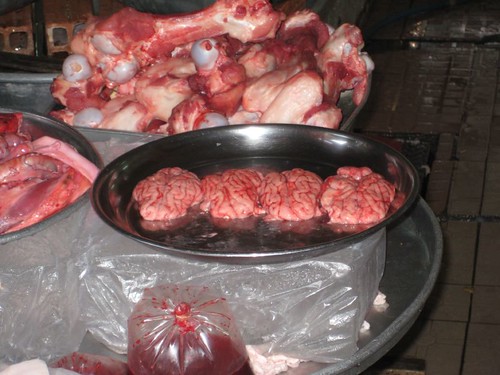 For lunch we sat in chairs that are sort you can buy for preschools, or really little kids. Not just similar to those chairs, but exactly the same as the ones four year old might sit on. I was honestly worried I would crush it. For some reasons a lot of these street places seem to have a love of incredibly small chairs. They also served us what looked for all the world like brown water. It was in big glasses with ice cubes and it just looked brown. It had no noticeable taste at all. I eventually saw some of the locals drinking it, and while I can't be 100% sure, I think it was tea, incredibly weak tea maybe, but just normal ice tea. The Chinese would go nuts over serving something they love as much as tea cold, in China even the beer is warm. After lunch we walked through the incredibly crowded streets to a big market. The market was divided into sections the first being meat and fish. I've never seen three brains of a plate before, so I can't be totally sure that's what they are, but they definitly looked the part. After that section was lunch food, followed by nick knacks, then apparel. Ken eventually stopped and bought a Vietnam soccer jersey, reveling in the fact that they were selling jerseys for soccer's 173rd best team. Ken carrying a bag only caused a bigger commotion from the vendors and soon we had to get out of there.
For lunch we sat in chairs that are sort you can buy for preschools, or really little kids. Not just similar to those chairs, but exactly the same as the ones four year old might sit on. I was honestly worried I would crush it. For some reasons a lot of these street places seem to have a love of incredibly small chairs. They also served us what looked for all the world like brown water. It was in big glasses with ice cubes and it just looked brown. It had no noticeable taste at all. I eventually saw some of the locals drinking it, and while I can't be 100% sure, I think it was tea, incredibly weak tea maybe, but just normal ice tea. The Chinese would go nuts over serving something they love as much as tea cold, in China even the beer is warm. After lunch we walked through the incredibly crowded streets to a big market. The market was divided into sections the first being meat and fish. I've never seen three brains of a plate before, so I can't be totally sure that's what they are, but they definitly looked the part. After that section was lunch food, followed by nick knacks, then apparel. Ken eventually stopped and bought a Vietnam soccer jersey, reveling in the fact that they were selling jerseys for soccer's 173rd best team. Ken carrying a bag only caused a bigger commotion from the vendors and soon we had to get out of there.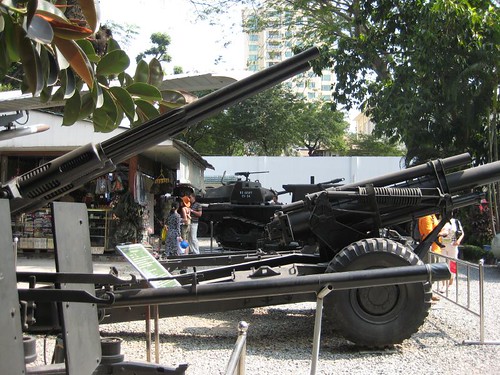 After that we went to the War Remnants Museum, which is supposed to be one of the best museums in Ho Chi Minh City. The museum is mostly filled with things left behind from what they call the American War. Outside there are tanks, planes, and what not, that look impressive but are probably replicas. Inside is the crux of the museum, a big room filled with photos and things about the US involvement, mostly the worst things done, during the war. It's very odd to stand in a museum dedicated to accusing your country of henious war crimes. The museum has its inacuraces and overstatements, but mostly it's pretty accurate. The whole place actually evoked in me a certain defiance. I hear quite a bit about the bad things America has done, but when it's another country accusing you it takes on a whole different tone, even when that country is the victim. Mostly I just didn't know what to feel. It was a mix of guilt, distance, and defiance, that just made it uncomfortable. The last section of the museum was an art display sort of about peace, but mostly about how great the government was. Having a display about peace in a museum about war is actually a nice touch, but it was just ill explained. The final section of the museum was an outdoor recreation of one of the most infamous prisons run by the South Vietnamese government. It was mostly run before US involvement, but the whole museum take pains not to show the war as a civil war but as a war against a foreign enemy. The whole place underscores how strange it is to be in Vietnam at all. This not so distant battlefield has gone the way of China embracing capitalism and tourism. What once was a place under siege is now looking to be seen as the hot tourism spot. Nothing reinforces this as well as the Pepsi umbrellas in the museum about American war crimes.
After that we went to the War Remnants Museum, which is supposed to be one of the best museums in Ho Chi Minh City. The museum is mostly filled with things left behind from what they call the American War. Outside there are tanks, planes, and what not, that look impressive but are probably replicas. Inside is the crux of the museum, a big room filled with photos and things about the US involvement, mostly the worst things done, during the war. It's very odd to stand in a museum dedicated to accusing your country of henious war crimes. The museum has its inacuraces and overstatements, but mostly it's pretty accurate. The whole place actually evoked in me a certain defiance. I hear quite a bit about the bad things America has done, but when it's another country accusing you it takes on a whole different tone, even when that country is the victim. Mostly I just didn't know what to feel. It was a mix of guilt, distance, and defiance, that just made it uncomfortable. The last section of the museum was an art display sort of about peace, but mostly about how great the government was. Having a display about peace in a museum about war is actually a nice touch, but it was just ill explained. The final section of the museum was an outdoor recreation of one of the most infamous prisons run by the South Vietnamese government. It was mostly run before US involvement, but the whole museum take pains not to show the war as a civil war but as a war against a foreign enemy. The whole place underscores how strange it is to be in Vietnam at all. This not so distant battlefield has gone the way of China embracing capitalism and tourism. What once was a place under siege is now looking to be seen as the hot tourism spot. Nothing reinforces this as well as the Pepsi umbrellas in the museum about American war crimes.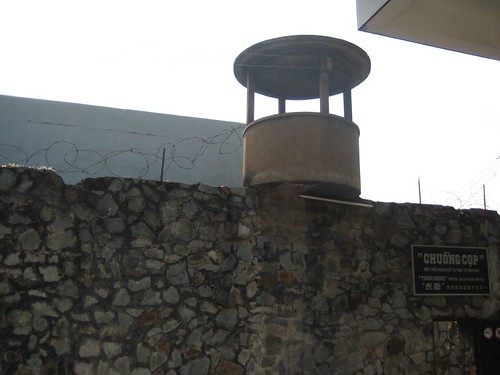 After the museum we went toward what is now called the Reunification Palace. It was originally built by the French and used by the South Vietnamese during the war. Unfortunately either it was closed, or we just weren't smart enough to find our way in. After that we headed to a Chinese style pagoda that was recommended by the guide book. Maybe the figures inside are some great example of some long forgotten movement of Buddhist art, and maybe the way the roof slants and the way the ceiling is painted means something I'm missing, but it was not the most impressive thing I've ever seen. China has given me a taste more for grandeur than detail. In China things are just huge. Maybe they have a lot of detail also, but mostly they're just big. This was just small and unimpressive looking. We wanted to go to dinner later but still had some time beforehand so we headed down toward the Saigon River. Ho Chi Minh City is really of two hearts about its name. In some things, especially official things, you only see it referred to as Ho Chi Minh City, but in lots of other places it is still Saigon. Not only in word of mouth either. I saw a ton of buses advertising rates from "Hanoi to Saigon." This is a great example of how Vietnam is different than China. In China if they want to change something it gets changed and all dissent gets squashed.
After the museum we went toward what is now called the Reunification Palace. It was originally built by the French and used by the South Vietnamese during the war. Unfortunately either it was closed, or we just weren't smart enough to find our way in. After that we headed to a Chinese style pagoda that was recommended by the guide book. Maybe the figures inside are some great example of some long forgotten movement of Buddhist art, and maybe the way the roof slants and the way the ceiling is painted means something I'm missing, but it was not the most impressive thing I've ever seen. China has given me a taste more for grandeur than detail. In China things are just huge. Maybe they have a lot of detail also, but mostly they're just big. This was just small and unimpressive looking. We wanted to go to dinner later but still had some time beforehand so we headed down toward the Saigon River. Ho Chi Minh City is really of two hearts about its name. In some things, especially official things, you only see it referred to as Ho Chi Minh City, but in lots of other places it is still Saigon. Not only in word of mouth either. I saw a ton of buses advertising rates from "Hanoi to Saigon." This is a great example of how Vietnam is different than China. In China if they want to change something it gets changed and all dissent gets squashed.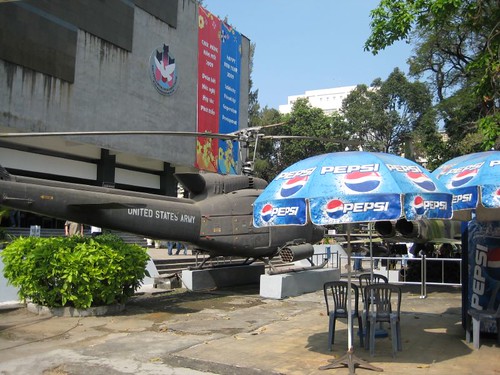 After seeing Dave read 1984 I started to think of all the similarities between China and the government in the book. They both have a ton of motoring, it's amazing how strong the similarity is between the TVs in 1984, which watch the people, and the internet in modern China. Both places also have an image of a leader that takes on a semi religious significance everywhere. China is also big on some of the ideas of 1984 like "double think," believing two contradictory things at the same time. China is for example run by the Communist Party who are devoted to a free market ideal. In Vietnam though that level of control just doesn't seem to exist. If some people want to call it Saigon it doesn't seem to matter too much to the government. As we walked we passed by a KFC, one of the few I saw in Vietnam, and I couldn't help but be impressed with how much Colonel Sanders looked like Ho Chi Minh. Uncle Ho, as he is sometimes referred to, is pictured as an older man balding on top with a mustache and a beard that comes down way pat his chin. He is to Vietnam what Mao is to China, only in some ways more so since he isn't tainted by some of the horrible things Mao did. His picture is everywhere, actually his picture is a lot better than Mao's.
After seeing Dave read 1984 I started to think of all the similarities between China and the government in the book. They both have a ton of motoring, it's amazing how strong the similarity is between the TVs in 1984, which watch the people, and the internet in modern China. Both places also have an image of a leader that takes on a semi religious significance everywhere. China is also big on some of the ideas of 1984 like "double think," believing two contradictory things at the same time. China is for example run by the Communist Party who are devoted to a free market ideal. In Vietnam though that level of control just doesn't seem to exist. If some people want to call it Saigon it doesn't seem to matter too much to the government. As we walked we passed by a KFC, one of the few I saw in Vietnam, and I couldn't help but be impressed with how much Colonel Sanders looked like Ho Chi Minh. Uncle Ho, as he is sometimes referred to, is pictured as an older man balding on top with a mustache and a beard that comes down way pat his chin. He is to Vietnam what Mao is to China, only in some ways more so since he isn't tainted by some of the horrible things Mao did. His picture is everywhere, actually his picture is a lot better than Mao's.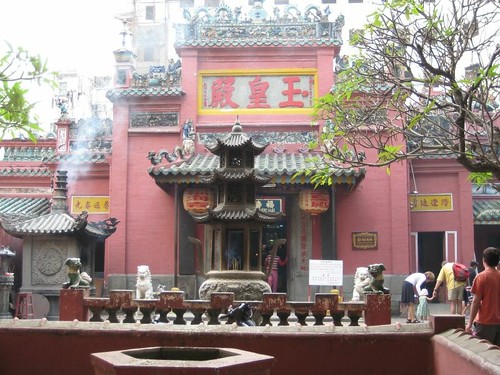 People tend to refer to him as "Uncle Ho." Referring to someone as your uncle connotes respect since an uncle is older than you. Carrie once got annoyed when some of the Tibetan students Dave sometimes hangs around with called her Aunt since it denotes someone physically older than you as well. Actually the slang term "son" works perfectly well in China since it denotes someone younger thus less respected then you. According to the guide book someone tried to open an Uncle Ho's Chicken, only to have the government stop them. I guess their sense of humor goes only so far. I just wonder if it would taste more like KFC or General Tso's Chicken. Also if you point out that Ho Chi Minh reminds you of Colonel Sanders people say that's ridiculous, Ho Chi Minh was a General.
People tend to refer to him as "Uncle Ho." Referring to someone as your uncle connotes respect since an uncle is older than you. Carrie once got annoyed when some of the Tibetan students Dave sometimes hangs around with called her Aunt since it denotes someone physically older than you as well. Actually the slang term "son" works perfectly well in China since it denotes someone younger thus less respected then you. According to the guide book someone tried to open an Uncle Ho's Chicken, only to have the government stop them. I guess their sense of humor goes only so far. I just wonder if it would taste more like KFC or General Tso's Chicken. Also if you point out that Ho Chi Minh reminds you of Colonel Sanders people say that's ridiculous, Ho Chi Minh was a General. We walked down to the river past some random piles of garbage left sitting on the side of the road. The river was wide and brown, though not nearly as dirty as any river I've seen in China. People were fishing for God only knows what, and mostly getting weeds. People their just weren't as interested in us as people in China. Maybe dropping an unbelievable number of bombs on a country makes them not as interested. We sat their for a while just enjoying being hot in January, until we decided to get a cab. The cab was a little fishy and the meter seemed to run up way too fast. We eventually got to the restaurant we wanted to go to only to discover that I had misread the book and it was closed on that day. We wanted to get back without another overpriced cab so we tried to get a bus. The big problem being that it seems that in Vietnam all the bus stops are unmarked and you simply have to know where the bus should stop. We missed a few trying to figure out where they would stop until we finally got on board. We looked out the window hoping it would take us in the direction we wanted to go and lo and behold it took us to within about two blocks of where we were trying to go for about 1/50th the price of the cab. On all our trips we seem to have good luck with random buses.
We walked down to the river past some random piles of garbage left sitting on the side of the road. The river was wide and brown, though not nearly as dirty as any river I've seen in China. People were fishing for God only knows what, and mostly getting weeds. People their just weren't as interested in us as people in China. Maybe dropping an unbelievable number of bombs on a country makes them not as interested. We sat their for a while just enjoying being hot in January, until we decided to get a cab. The cab was a little fishy and the meter seemed to run up way too fast. We eventually got to the restaurant we wanted to go to only to discover that I had misread the book and it was closed on that day. We wanted to get back without another overpriced cab so we tried to get a bus. The big problem being that it seems that in Vietnam all the bus stops are unmarked and you simply have to know where the bus should stop. We missed a few trying to figure out where they would stop until we finally got on board. We looked out the window hoping it would take us in the direction we wanted to go and lo and behold it took us to within about two blocks of where we were trying to go for about 1/50th the price of the cab. On all our trips we seem to have good luck with random buses.The restaurant was a sort of French and Vietnamese mix and the food was really good. It was a little pricey so we saw pretty much only westerners in there. After dinner we went to a fancy hotel that had a rooftop bar. The prices were high but the view was fantastic. They had a Spanish band which was weird though the music was somehow appropriate for the tropical weather. We sat and had drink while I thought what an odd turn had my life taken that I was somehow sitting on a rooftop in Vietnam drinking a Mojito.
2 comments:
What a great way to end today's post -- drinking a mojito on a rooftop in Vietnam. Also loved the descriptions of crossing the street and the pretty girl who called you Danny.
i know what you mean about the odd feeling of natoinalism that comes with being so far from home. Weird isn't it, that you feel go-USA when you're confronted with the enormity of the devastation the U.S. brought to Vietnam. Anyway, it was a terrific post and very witty. Mojitos, btw, probably came to Vietnam from Cuba as part of 1960s communist solidarity. (No joke. The Cubans always admired the Vietnamese and hated the Chinese.)
Post a Comment